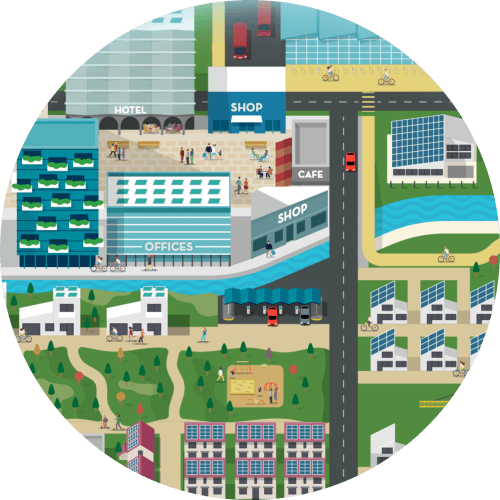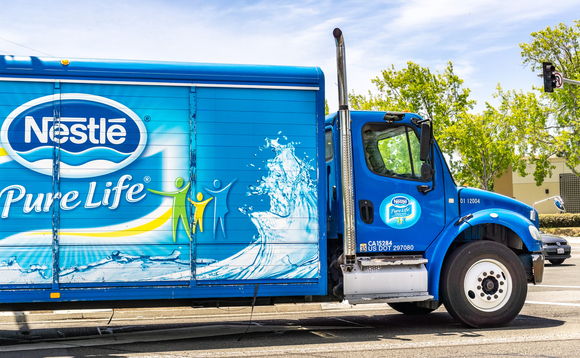Designing for the Climate: Architectural Collaborative on their Journey to Net Zero
Architectural Collaborative, a small architecture firm in Athens, Georgia, sets ambitious climate goals to mitigate climate change that also support its local community and provide long-term business benefits — all actions which are rooted in the firm’s belief that climate and business priorities are “one and the same thing.”
From fires to floods, the impacts of climate change are becoming increasingly dangerous and expensive for every sector of society, from national governments and local communities to businesses, large and small. For Architectural Collaborative (Arcollab), an innovative small architecture and design firm based in Athens, Georgia, this means increasing monthly energy bills to cool their studio as the southern U.S. endures longer periods of extreme heat.
“We’re past the point in time where we can afford to put blinders on and pretend that every decision we make in our business operations doesn’t have an impact on our environment,” said Quint Newcomer, the firm’s Director of Sustainability and Business Administration. With the support of the SME Climate Hub, Arcollab, which hosts nine employees in its one studio, is setting ambitious climate goals to cut its emissions at least in half by 2030 — all actions which are rooted in the firm’s belief that climate and business priorities are “one and the same thing.”
Alongside thousands of small and medium-sized businesses that are a part of the SME Climate Hub, Arcollab is taking a critical look at their entire operations to determine where it can reduce its carbon outputs. This effort is part of the larger United Nations Race to Zero campaign, an international campaign that brings together an unprecedented coalition of real economy actors and 120 governments committed to achieve net-zero emissions by no later than 2050.
“We’re very aware of the impacts – both positive and negative – that design and the built environment have with respect to our environment, including emissions which exacerbate the changes to our climate,” Newcomer said. “Ninety-five percent of our environmental problems could have been avoided had a more thoughtful approach been taken during the design phase,” he added, referencing a quote from the esteemed architect and leader in sustainable development and design, William McDonough.
The first step small businesses can take towards reducing their emissions is to identify their largest sources of emissions. For Arcollab, whose practice involves designing for new construction, improved sustainability, historic preservation, evaluating existing building conditions and master planning in the southeastern U.S., their emissions stem primarily from its electricity consumption, personal vehicles used for business purposes and trash-to-landfill transportation. While the firm hopes to collaborate with their building’s owner to install solar panels to cut its electricity purchase by 80 percent, they are currently integrating near-term changes into its operations to make up for the emissions it is unable to eliminate right away. As part of the retrofit to their current studio, they improved insulation and windows, installed sustainable and environmentally friendly lighting, and have maintained a commitment to using sustainable paper materials and cleaning supplies in their studio.
Arcollab also relies on offsets to counter the emissions they cannot eliminate in the immediate future, including the purchase of 40 tonnes of CO2e offsets covering their 2020-2021 emissions through the Bonneville Environmental Foundation. The path to net-zero is also integrated into Arcollab’s design process, ensuring environmental responsibility is a priority when accounting for its Scope 3 emissions — the emissions across its value chain.
Architects hold a significant amount of influence to spur climate action and sustainability through their design “decisions about buildings that are built and rehabilitated, to individual home and business owners who want to build and rehabilitate their homes and offices,” Newcomer added. Arcollab’s recent rehabilitation of the historic Monroe Livery Stable building, which won a Georgia Trust for Historic Preservation Award for Excellence in Sustainable Restoration in 2022, is just one example of this.
In 2015, a local couple purchased the building, which was built in the early 1900s, which was slated for demolition to become a downtown parking lot. Arcollab was enlisted to rehabilitate the building which was in a severe state of disrepair with collapsed roofs and major structural damage. The firm helped the new owners transform this building into the Wayfarer Music Hall. By equipping the venue with LED lighting, utilizing high efficiency variable refrigerant flow (VRF) mechanical systems, and installing a rooftop solar array, and by relying on local, recycled, and renewable building materials, Arcollab was able to help the hall achieve net zero energy efficiency.
While this design process provides direct benefits to the climate and the surrounding community, these efforts also differentiate Arcollab from other architecture firms. “The smartest economic decision-making for long-term business success is to stabilize climate and other significant pressing environmental challenges,” Newcomer said.
Although Arcollab forges a pathway to net zero for other firms to follow, it cannot achieve the broader UN Race to Zero climate goals alone. That’s why Newcomer also calls on local, state, and national governments to incentivize polluter pays regulations. “It should cost more to do it wrong than to do it right,” he said. “Nothing will change until this sort of power structure changes and the single-minded goal of short-term financial gain becomes secondary to health and well-being as our measure of success and achievement and prosperity.”
Arcollab’s efforts to mitigate climate change provides a blueprint for similar businesses wanting to reduce their carbon footprints. For small businesses that may be intimidated to take this first step, Newcomer encourages them to just “Take it! You don’t have to fix everything or take huge steps overnight, [but] every effort matters.”
Making the SME Climate Hub commitment has helped Arcollab take these steps, using its tools to set ambitious climate goals and become part of a movement larger than themselves. “We care about our kids, our community, our planet,” Newcomer concluded. [Setting and meeting climate goals] is “the right thing to do and it’s reflective of the culture we want for our company.”

 Go back
Go back





